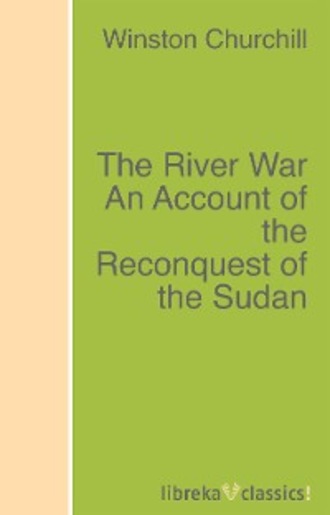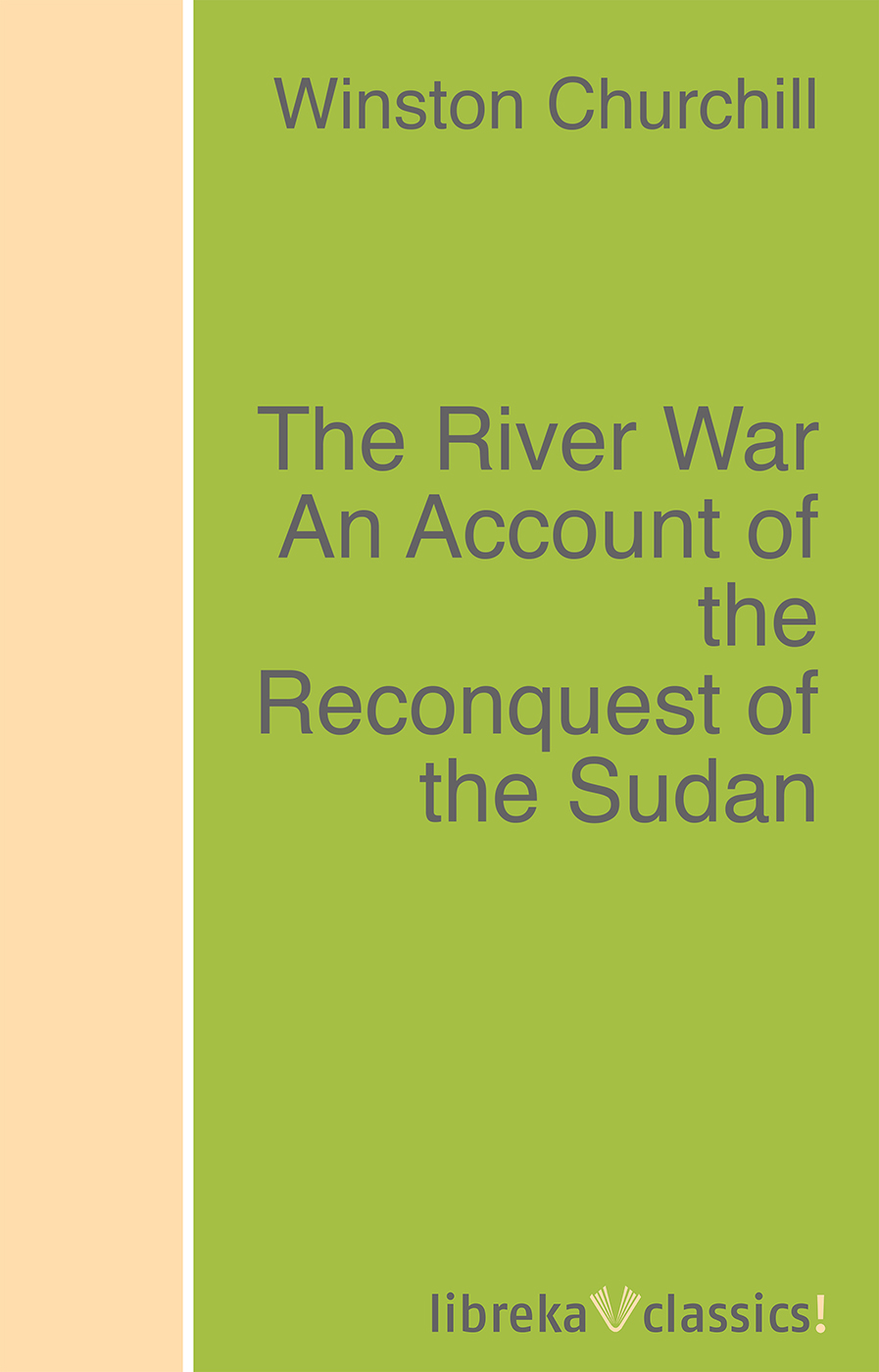
Полная версия
The River War An Account of the Reconquest of the Sudan


Titel: The River War / An Account of the Reconquest of the Sudan
von Oliver Goldsmith, Samuel Pepys, William Dean Howells, John Burroughs, William Harmon Norton, L. Mühlbach, Franklin Knight Lane, Walter Pater, Jonathan Swift, Augusta J. Evans, Trumbull White, Kathleen Thompson Norris, Matthew Arnold, Charles W. Colby, Shakespeare, James Fenimore Cooper, D. H. Lawrence, James Joyce, Ada Cambridge, Philip E. Muskett, Catherine Helen Spence, Rolf Boldrewood, Ernest Scott, Fergus Hume, H. G. Wells, Victor [pseud.] Appleton, Roald Amundsen, Max Simon Nordau, Henry David Thoreau, E. Phillips Oppenheim, Richard Wagner, Franz Liszt, Charlotte Mary Yonge, Charles Henry Eden, Charles Babbage, T. R. Malthus, Unknown, Joseph Ernest Morris, Robert Southey, Isabella L. Bird, Charles James Fox, Thomas Hariot, Cyrus Thomas, Bart Haley, Christopher Morley, Edgar Saltus, Marie Corelli, Edmund Lester Pearson, Robert Browning, John Aubrey, Benjamin Nathaniel Bogue, John McElroy, John Galsworthy, Henry James, Hamilton Wright Mabie, Mina Benson Hubbard, Elizabeth Cleghorn Gaskell, John Keble, Henry Lindlahr, Richard Henry Dana, Annie Wood Besant, Immanuel Kant, John Habberton, Baron Edward John Moreton Drax Plunkett Dunsany, T. B. Ray, Isabel Ecclestone Mackay, Frank C. Haddock, William John Locke, baron Arthur Léon Imbert de Saint-Amand, Ralph Centennius, United States, Library of Congress. Copyright Office, James Otis, George Hartmann, Sir Arthur Conan Doyle, George Gissing, John Henry Tilden, Thomas Wright, Frederick Samuel Dellenbaugh, Anonymous, J. Clontz, David Hume, Margot Asquith, Elmer Ulysses Hoenshel, Byron J. Rees, Lida B. McMurry, Georges Duhamel, Ramsay Muir, Edith Wharton, Charles Sturt, Lola Ridge, J. M. Stone, Annie Payson Call, Grant Allen, kniaz Petr Alekseevich Kropotkin, Steve Solomon, Isabel Moser, Aleksandr Sergeevich Pushkin, Horace W. C. Newte, Charles Darwin, Maurice Maeterlinck, Walter Bagehot, Henri Bergson, George Randolph Chester, John S. C. Abbott, L. Frank Baum, William T. Sherman, Philip Henry Sheridan, Friedrich Wilhelm Nietzsche, Ambrose Bierce, Ulysses S. Grant, F. Scott Fitzgerald, Alfred Lichtenstein, Abbot of Nogent-sous-Coucy Guibert, Nellie L. McClung, Alice Caldwell Hegan Rice, E. Nesbit, Henri Barbusse, J. M. Synge, Frank Norris, Louis Hémon, Henry Van Dyke, Thomas Guthrie Marquis, Susanna Moodie, Frank Bigelow Tarbell, René Descartes, Kirk Munroe, Francis Hopkinson Smith, Edna St. Vincent Millay, Talbot Mundy, George Meredith, Clemens Brentano, James De Mille, James Allen, Norman Douglas, Bolton Hall, Arthur Christopher Benson, James Oliver Curwood, Frank Jardine, Bertram Lenox Simpson, Freiherr von Justus Liebig, Cyril G. Hopkins, Mary Eleanor Wilkins Freeman, Evelyn Scott, Charles Monroe Sheldon, George Berkeley, Steven Sills, Sara Jeannette Duncan, Jules Verne, Irvin S. Cobb, Zane Grey, August von Kotzebue, John Addington Symonds, Marjorie Allen Seiffert, J. B. Bury, William Makepeace Thackeray, Jules Renard, Susan Coolidge, Huguette Bertrand, Mrs. C. F. Fraser, Ottilie A. Liljencrantz, William Morton Payne, Henry Adams, T. S. Arthur, Orison Swett Marden, T. S. Ackland, Anthony Trollope, graf Leo Tolstoy, Robert Smythe Hichens, Émile Gaboriau, Wilkie Collins, Charles Reade, Horace Walpole, Jennette Lee, Thomas Dykes Beasley, Inez Haynes Gillmore, L. H. Woolley, John Francis Davis, James B. Stetson, William Day Simonds, James O'Meara, Almira Bailey, Cuthbert Bede, Voltaire, Percy Bysshe Shelley, William Bennett Munro, Sir Richard Francis Burton, Horatio Alger, Paul Verlaine, Samuel Vaknin, William Ralph Inge, Madame de Staël, J. Hector St. John de Crèvecoeur, L. A. Abbott, F. Colburn Adams, John S. Adams, Thornton W. Burgess, Glenn D. Bradley, Eugen Neuhaus, Arthur E. Knights, Bret Harte, Maturin Murray Ballou, Jane G. Austin, Samuel Johnson, Frederick Niecks, Stephen Leacock, Suelette Dreyfus, Stéphane Mallarmé, Lyndon Orr, William Le Queux, Mary Wollstonecraft Shelley, Jeannie Gunn, Jean François Regnard, John Ruskin, A. I. Kuprin, Pierre Louÿs, George Barr McCutcheon, John Munro, Holman Day, William Stearns Davis, John Richardson, Mary Jane Holmes, Oliver Wendell Holmes, Finley Peter Dunne, C. J. Dennis, Ethel Sybil Turner, Julius Wellhausen, Arnold Bennett, Harold Bell Wright, Guðmundur Kamban, Charles Stuart Calverley, A. E. W. Mason, Charles Rivière Dufresny, David Starr Jordan, Wallace Irwin, J. W. Wright, Thomas Hardy, United States Rubber Company, Helen Reimensnyder Martin, William Fayette Fox, Lewis Carroll, Anna Katharine Green, Shell Union Oil Corporation, Louisa May Alcott, Theocritus, of Phlossa near Smyrna Bion, Moschus, Bertrand Russell, Guy de Maupassant, Henrik Ibsen, James Whitcomb Riley, Josephine Lawrence, Pierre Loti, Harry Alverson Franck, Albert Payson Terhune, Harold MacGrath, G. A. Henty, Harriet A. Adams, John Lothrop Motley, H. E. Bird, Joseph Crosby Lincoln, Michel Baron, Gene Stratton-Porter, James Clerk Maxwell, Norman Lindsay, Edward Lasker, Margaret Penrose, S. R. Crockett, Austin Hall, Homer Eon Flint, Various, Clarence Edward Mulford, Upton Sinclair, John Andreas Widtsoe, Thomas Bulfinch, David Graham Phillips, John Kendrick Bangs, Edmond Jaloux, Emile Littré, 13th cent. de Boron Robert, Samuel Butler, James Huneker, Jessie Graham [pseud.] Flower, St. George Rathborne, Charles Wesley Emerson, Winston Churchill
ISBN 978-3-7429-4793-2
Alle Rechte vorbehalten.
Es ist ohne vorherige schriftliche Erlaubnis nicht gestattet, dieses Werk im Ganzen oder in Teilen zu vervielfältigen oder zu veröffentlichen.
THE RIVER WAR
An Account of the Reconquest of the Sudan
(1902 edition)
By Winston S. Churchill
Contents
CHAPTER I. THE REBELLION OF THE MAHDI CHAPTER II. THE FATE OF THE ENVOY CHAPTER III. THE DERVISH EMPIRE CHAPTER IV. THE YEARS OF PREPARATION CHAPTER V. THE BEGINNING OF THE WAR CHAPTER VI. FIRKET CHAPTER VII. THE RECOVERY OF THE DONGOLA PROVINCE CHAPTER VIII. THE DESERT RAILWAY CHAPTER IX. ABU HAMED CHAPTER X. BERBER CHAPTER XI. RECONNAISSANCE CHAPTER XII. THE BATTLE OF THE ATBARA CHAPTER XIII. THE GRAND ADVANCE CHAPTER XIV. THE OPERATIONS OF THE FIRST OF SEPTEMBER CHAPTER XV. THE BATTLE OF OMDURMAN CHAPTER XVI. THE FALL OF THE CITY CHAPTER XVII. 'THE FASHODA INCIDENT' CHAPTER XVIII. ON THE BLUE NILE CHAPTER XIX. THE END OF THE KHALIFA APPENDIX.
CHAPTER I: THE REBELLION OF THE MAHDI
The north-eastern quarter of the continent of Africa is drained and watered by the Nile. Among and about the headstreams and tributaries of this mighty river lie the wide and fertile provinces of the Egyptian Soudan. Situated in the very centre of the land, these remote regions are on every side divided from the seas by five hundred miles of mountain, swamp, or desert. The great river is their only means of growth, their only channel of progress. It is by the Nile alone that their commerce can reach the outer markets, or European civilisation can penetrate the inner darkness. The Soudan is joined to Egypt by the Nile, as a diver is connected with the surface by his air-pipe. Without it there is only suffocation. Aut Nilus, aut nihil!
The town of Khartoum, at the confluence of the Blue and White Niles, is the point on which the trade of the south must inevitably converge. It is the great spout through which the merchandise collected from a wide area streams northwards to the Mediterranean shore. It marks the extreme northern limit of the fertile Soudan. Between Khartoum and Assuan the river flows for twelve hundred miles through deserts of surpassing desolation. At last the wilderness recedes and the living world broadens out again into Egypt and the Delta. It is with events that have occurred in the intervening waste that these pages are concerned.
The real Soudan, known to the statesman and the explorer, lies far to the south—moist, undulating, and exuberant. But there is another Soudan, which some mistake for the true, whose solitudes oppress the Nile from the Egyptian frontier to Omdurman. This is the Soudan of the soldier. Destitute of wealth or future, it is rich in history. The names of its squalid villages are familiar to distant and enlightened peoples. The barrenness of its scenery has been drawn by skilful pen and pencil. Its ample deserts have tasted the blood of brave men. Its hot, black rocks have witnessed famous tragedies. It is the scene of the war.
This great tract, which may conveniently be called 'The Military Soudan,' stretches with apparent indefiniteness over the face of the continent. Level plains of smooth sand—a little rosier than buff, a little paler than salmon—are interrupted only by occasional peaks of rock—black, stark, and shapeless. Rainless storms dance tirelessly over the hot, crisp surface of the ground. The fine sand, driven by the wind, gathers into deep drifts, and silts among the dark rocks of the hills, exactly as snow hangs about an Alpine summit; only it is a fiery snow, such as might fall in hell. The earth burns with the quenchless thirst of ages, and in the steel-blue sky scarcely a cloud obstructs the unrelenting triumph of the sun.
Through the desert flows the river—a thread of blue silk drawn across an enormous brown drugget; and even this thread is brown for half the year. Where the water laps the sand and soaks into the banks there grows an avenue of vegetation which seems very beautiful and luxuriant by contrast with what lies beyond. The Nile, through all the three thousand miles of its course vital to everything that lives beside it, is never so precious as here. The traveller clings to the strong river as to an old friend, staunch in the hour of need. All the world blazes, but here is shade. The deserts are hot, but the Nile is cool. The land is parched, but here is abundant water. The picture painted in burnt sienna is relieved by a grateful flash of green.
Yet he who had not seen the desert or felt the sun heavily on his shoulders would hardly admire the fertility of the riparian scrub. Unnourishing reeds and grasses grow rank and coarse from the water's edge. The dark, rotten soil between the tussocks is cracked and granulated by the drying up of the annual flood. The character of the vegetation is inhospitable. Thorn-bushes, bristling like hedgehogs and thriving arrogantly, everywhere predominate and with their prickly tangles obstruct or forbid the path. Only the palms by the brink are kindly, and men journeying along the Nile must look often towards their bushy tops, where among the spreading foliage the red and yellow glint of date clusters proclaims the ripening of a generous crop, and protests that Nature is not always mischievous and cruel.
The banks of the Nile, except by contrast with the desert, display an abundance of barrenness. Their characteristic is monotony. Their attraction is their sadness. Yet there is one hour when all is changed. Just before the sun sets towards the western cliffs a delicious flush brightens and enlivens the landscape. It is as though some Titanic artist in an hour of inspiration were retouching the picture, painting in dark purple shadows among the rocks, strengthening the lights on the sands, gilding and beautifying everything, and making the whole scene live. The river, whose windings make it look like a lake, turns from muddy brown to silver-grey. The sky from a dull blue deepens into violet in the west. Everything under that magic touch becomes vivid and alive. And then the sun sinks altogether behind the rocks, the colors fade out of the sky, the flush off the sands, and gradually everything darkens and grows grey—like a man's cheek when he is bleeding to death. We are left sad and sorrowful in the dark, until the stars light up and remind us that there is always something beyond.
In a land whose beauty is the beauty of a moment, whose face is desolate, and whose character is strangely stern, the curse of war was hardly needed to produce a melancholy effect. Why should there be caustic plants where everything is hot and burning? In deserts where thirst is enthroned, and where the rocks and sand appeal to a pitiless sky for moisture, it was a savage trick to add the mockery of mirage.
The area multiplies the desolation. There is life only by the Nile. If a man were to leave the river, he might journey westward and find no human habitation, nor the smoke of a cooking fire, except the lonely tent of a Kabbabish Arab or the encampment of a trader's caravan, till he reached the coast-line of America. Or he might go east and find nothing but sand and sea and sun until Bombay rose above the horizon. The thread of fresh water is itself solitary in regions where all living things lack company.
In the account of the River War the Nile is naturally supreme. It is the great melody that recurs throughout the whole opera. The general purposing military operations, the statesman who would decide upon grave policies, and the reader desirous of studying the course and results of either, must think of the Nile. It is the life of the lands through which it flows. It is the cause of the war: the means by which we fight; the end at which we aim. Imagination should paint the river through every page in the story. It glitters between the palm-trees during the actions. It is the explanation of nearly every military movement. By its banks the armies camp at night. Backed or flanked on its unfordable stream they offer or accept battle by day. To its brink, morning and evening, long lines of camels, horses, mules, and slaughter cattle hurry eagerly. Emir and Dervish, officer and soldier, friend and foe, kneel alike to this god of ancient Egypt and draw each day their daily water in goatskin or canteen. Without the river none would have started. Without it none might have continued. Without it none could ever have returned.
All who journey on the Nile, whether in commerce or war, will pay their tribute of respect and gratitude; for the great river has befriended all races and every age. Through all the centuries it has performed the annual miracle of its flood. Every year when the rains fall and the mountain snows of Central Africa begin to melt, the head-streams become torrents and the great lakes are filled to the brim. A vast expanse of low, swampy lands, crossed by secondary channels and flooded for many miles, regulates the flow, and by a sponge-like action prevents the excess of one year from causing the deficiency of the next. Far away in Egypt, prince, priest, and peasant look southwards with anxious attention for the fluctuating yet certain rise. Gradually the flood begins. The Bahr-el-Ghazal from a channel of stagnant pools and marshes becomes a broad and navigable stream. The Sobat and the Atbara from dry watercourses with occasional pools, in which the fish and crocodiles are crowded, turn to rushing rivers. But all this is remote from Egypt. After its confluence with the Atbara no drop of water reaches the Nile, and it flows for seven hundred miles through the sands or rushes in cataracts among the rocks of the Nubian desert. Nevertheless, in spite of the tremendous diminution in volume caused by the dryness of the earth and air and the heat of the sun—all of which drink greedily—the river below Assuan is sufficiently great to supply nine millions of people with as much water as their utmost science and energies can draw, and yet to pour into the Mediterranean a low-water surplus current of 61,500 cubic feet per second. Nor is its water its only gift. As the Nile rises its complexion is changed. The clear blue river becomes thick and red, laden with the magic mud that can raise cities from the desert sand and make the wilderness a garden. The geographer may still in the arrogance of science describe the Nile as 'a great, steady-flowing river, fed by the rains of the tropics, controlled by the existence of a vast head reservoir and several areas of repose, and annually flooded by the accession of a great body of water with which its eastern tributaries are flushed' [ENCYCLOPAEDIA BRITANNICA]; but all who have drunk deeply of its soft yet fateful waters—fateful, since they give both life and death—will understand why the old Egyptians worshipped the river, nor will they even in modern days easily dissociate from their minds a feeling of mystic reverence.
South of Khartoum and of 'The Military Soudan' the land becomes more fruitful. The tributaries of the Nile multiply the areas of riparian fertility. A considerable rainfall, increasing as the Equator is approached, enables the intervening spaces to support vegetation and consequently human life. The greater part of the country is feverish and unhealthy, nor can Europeans long sustain the attacks of its climate. Nevertheless it is by no means valueless. On the east the province of Sennar used to produce abundant grain, and might easily produce no less abundant cotton. Westward the vast territories of Kordofan and Darfur afford grazing-grounds to a multitude of cattle, and give means of livelihood to great numbers of Baggara or cow-herd Arabs, who may also pursue with activity and stratagem the fleet giraffe and the still fleeter ostrich. To the south-east lies Bahr-el-Ghazal, a great tract of country occupied by dense woods and plentifully watered. Further south and nearer the Equator the forests and marshes become exuberant with tropical growths, and the whole face of the land is moist and green. Amid groves of gigantic trees and through plains of high waving grass the stately elephant roams in herds which occasionally number four hundred, hardly ever disturbed by a well-armed hunter. The ivory of their tusks constitutes the wealth of the Equatorial Province. So greatly they abound that Emin Pasha is provoked to complain of a pest of these valuable pachyderms [LIFE OF EMIN PASHA, vol.i chapter ix.]: and although they are only assailed by the natives with spear and gun, no less than twelve thousand hundredweight of ivory has been exported in a single year [Ibid.] All other kinds of large beasts known to man inhabit these obscure retreats. The fierce rhinoceros crashes through the undergrowth. Among the reeds of melancholy swamps huge hippopotami, crocodiles, and buffaloes prosper and increase. Antelope of every known and many unclassified species; serpents of peculiar venom; countless millions of birds, butterflies, and beetles are among the offspring of prolific Nature. And the daring sportsman who should survive his expedition would not fail to add to the achievements of science and the extent of natural history as well as to his own reputation.
The human inhabitants of the Soudan would not, but for their vices and misfortunes, be disproportioned in numbers to the fauna or less happy. War, slavery, and oppression have, however, afflicted them until the total population of the whole country does not exceed at the most liberal estimate three million souls. The huge area contains many differences of climate and conditions, and these have produced peculiar and diverse breeds of men. The Soudanese are of many tribes, but two main races can be clearly distinguished: the aboriginal natives, and the Arab settlers. The indigenous inhabitants of the country were negroes as black as coal. Strong, virile, and simple-minded savages, they lived as we may imagine prehistoric men—hunting, fighting, marrying, and dying, with no ideas beyond the gratification of their physical desires, and no fears save those engendered by ghosts, witchcraft, the worship of ancestors, and other forms of superstition common among peoples of low development. They displayed the virtues of barbarism. They were brave and honest. The smallness of their intelligence excused the degradation of their habits. Their ignorance secured their innocence. Yet their eulogy must be short, for though their customs, language, and appearance vary with the districts they inhabit and the subdivisions to which they belong, the history of all is a confused legend of strife and misery, their natures are uniformly cruel and thriftless, and their condition is one of equal squalor and want.
Although the negroes are the more numerous, the Arabs exceed in power. The bravery of the aboriginals is outweighed by the intelligence of the invaders and their superior force of character. During the second century of the Mohammedan era, when the inhabitants of Arabia went forth to conquer the world, one adventurous army struck south. The first pioneers were followed at intervals by continual immigrations of Arabs not only from Arabia but also across the deserts from Egypt and Marocco. The element thus introduced has spread and is spreading throughout the Soudan, as water soaks into a dry sponge. The aboriginals absorbed the invaders they could not repel. The stronger race imposed its customs and language on the negroes. The vigour of their blood sensibly altered the facial appearance of the Soudanese. For more than a thousand years the influence of Mohammedanism, which appears to possess a strange fascination for negroid races, has been permeating the Soudan, and, although ignorance and natural obstacles impede the progress of new ideas, the whole of the black race is gradually adopting the new religion and developing Arab characteristics. In the districts of the north, where the original invaders settled, the evolution is complete, and the Arabs of the Soudan are a race formed by the interbreeding of negro and Arab, and yet distinct from both. In the more remote and inaccessible regions which lie to the south and west the negro race remains as yet unchanged by the Arab influence. And between these extremes every degree of mixture is to be found. In some tribes pure Arabic is spoken, and prior to the rise of the Mahdi the orthodox Moslem faith was practised. In others Arabic has merely modified the ancient dialects, and the Mohammedan religion has been adapted to the older superstitions; but although the gap between the Arab-negro and the negro-pure is thus filled by every intermediate blend, the two races were at an early date quite distinct.



